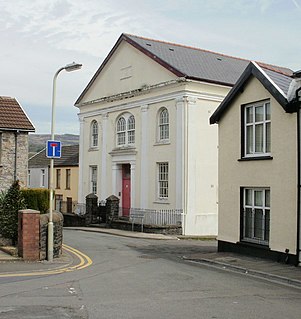Related Research Articles

Aberdare is a town in the Cynon Valley area of Rhondda Cynon Taf, Wales, at the confluence of the Rivers Dare (Dâr) and Cynon. Aberdare has a population of 39,550. Aberdare is 4 miles (6 km) south-west of Merthyr Tydfil, 20 miles (32 km) north-west of Cardiff and 22 miles (35 km) east-north-east of Swansea. During the 19th century it became a thriving industrial settlement, which was also notable for the vitality of its cultural life and as an important publishing centre.

Henry Austin Bruce, 1st Baron Aberdare,, was a British Liberal Party politician, who served in government most notably as Home Secretary (1868–1873) and as Lord President of the Council.

Abercynon, is both a village and a community in the Cynon Valley within the unitary authority of Rhondda Cynon Taf, Wales. The community comprises the village and the districts of Carnetown and Grovers Field to the south, Navigation Park to the east, and Glancynon to the north.

Trecynon is a village near Aberdare situated in the Cynon Valley, in Rhondda Cynon Taf, Wales. It dates from the early nineteenth century and developed as a result of the opening of the Aberdare Ironworks at Llwydcoed in 1800.
Merthyr Tydfil was a parliamentary constituency centred on the town of Merthyr Tydfil in Glamorgan. From 1832 to 1868 it returned one Member of Parliament (MP) to the House of Commons of the Parliament of the United Kingdom, and in 1868 this was increased to two members. The two-member constituency was abolished for the 1918 general election.
Aberdare Urban District Council was a local authority in Aberdare, Wales.

Thomas Price was a leading figure in the political and religious life of Victorian Wales, and the central figure of the Cynon Valley for more than forty years.
The Aberdare Urban District Council was established in 1894 and covered the parish of Aberdare. Its responsibilities included public health, sanitation, roads and public works generally.
The second election to the Glamorgan County Council was held on 8 March 1892. The 1889 election was the first contest and the next was the 1895 election. Glamorgan County Council had been established by the 1888 Local Government Act, and the first election held in January 1889. Glamorgan was by far the largest county in Wales in terms of population. The county of Glamorgan was at this time becoming heavily industrialised, although some areas such as the Vale of Glamorgan remained essentially rural. The rise of nonconformist liberalism, especially since the 1860s, throughout Wales, had challenged the prevailing influence of the landed gentry. However, even in 1889, the traditional forces remained influential and no working men were elected to the Council. This changed in 1892 with the unopposed return of David Morgan in Aberdare and the success of Isaac Evans in Resolven.
The third election to Glamorgan County Council election was held on 4 March 1895. It was preceded by the 1892 election and followed by the 1898 election.
David Morgan was a Welsh miners' agent and trade unionist who played a prominent role in the history of industrial relations in the South Wales Coalfield from the 1870s until his death in 1900.
The Glamorgan County Council election, 1898 was the fourth contest for seats on this authority. It was preceded by the 1895 election and followed by the 1901 election. Glamorgan was by far the largest county in Wales in terms of population. Glamorgan County Council had been established by the 1888 Local Government Act, and the first elections held in early 1889. The county of Glamorgan was at this time becoming heavily industrialised, although some areas such as the Vale of Glamorgan remained essentially rural. The rise of nonconformist liberalism, especially since the 1860s, throughout Wales, had challenged the prevailing influence of the landed gentry. However, even in 1889, the traditional forces remained influential and no working men were elected to the Council. This changed in 1892 with the unopposed return of David Morgan in Aberdare and the success of Isaac Evans in Resolven.

Gadlys Chapel was a Baptist chapel in Railway Street, Gadlys, Aberdare, Rhondda Cynon Taf, Wales. It was formed as a branch of Calfaria, Aberdare.
Owen Harris was a Liberal politician and municipal leader in Aberdare, South Wales.

Ebenezer, Trecynon was an Independent (Congregationalist) chapel in Ebenezer Street, Trecynon, Aberdare, Wales. It was one of the earliest Independent chapels in the Cynon Valley and remained an active place of worship until 2009.

The Rev. Daniel Davies, D. D. was a Welsh Baptist preacher, also known as "Y Dyn Dall".
James Goronwy Mathias (1842–1895), also known under the pen name Goronwy Ddu, was a Baptist minister and writer.
John Davies was a Welsh politician and trade unionist, who served as Mayor of Merthyr.
The Aberdare, Merthyr and Dowlais Miners' Association was a trade union representing coal miners in part of Glamorgan in South Wales.
Soar, Llwydcoed was a Baptist Chapel in Kingsbury Place, Llwydcoed, Aberdare, Glamorgan, Wales. Services at Soar were held in the Welsh language.
References
- 1 2 3 4 5 Roberts, T.R.; Williams, Robert (1908). Eminent Welshmen : a short biographical dictionary of Welshmen who have attained distinction from the earliest times to the present. Cardiff & Merthyr Tydfil. pp. 92–93. ISBN 9780806345949.
- ↑ "EVANS , BENJAMIN ( Telynfab ; 1844 - 1900 )". Dictionary of Welsh Biography . National Library of Wales. 1959. Retrieved 20 October 2013.
- ↑ "Brief Extracts From The Governors' Minute Book 1896 - 1913". Aberdare Boys Grammar School. 2013. Retrieved 20 October 2013.
- ↑ "County Council Bye-Elections. Noisy Proceedings at Aberdare". Merthyr Times. 28 March 1895. Retrieved 26 April 2014.